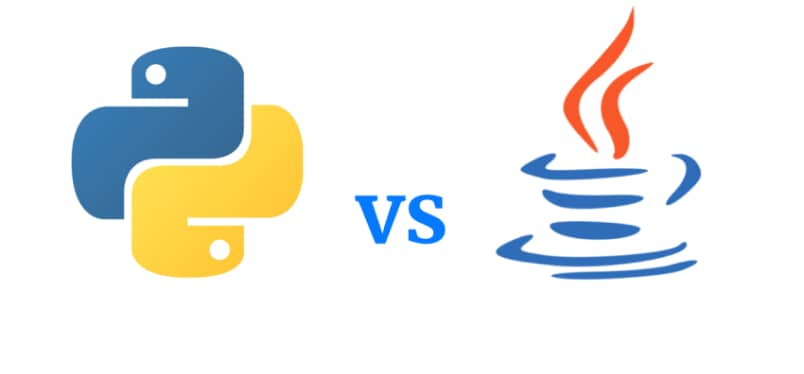Java vs Python - Everything You Need to Know!
Programming languages are the fundamental tools for machine learning that any programmer should have at their disposal since they are essential to every endeavor. Even for a seasoned developer, selecting the appropriate programming language among the available options might be difficult.
Both Java and Python are considered to be two of the most commonly used programming languages with Java being the most popular language. Java is the more efficient language, while Python programs are more straightforward and less difficult to understand.
Each one is well-established, free of any platform, and a component of a sizable community that offers assistance. However, beyond that, there are no other parallels. When comparing Python vs Java, it's important to keep in mind that each programming language serves a variety of objectives, each of which has its own set of applications, as well as both advantages and disadvantages.
Let’s dive deep into the details and learn more about the said programming language. In this case, we will discuss Java vs Python.

Java vs Python - Classifications…
Explaining Java
Java is an object-oriented programming language that is statically typed and may be used for a variety of purposes. The fact that Java is a compiled language, as opposed to Python, is among the factors that contribute to the notion that it is the more efficient choice.
The creation of Android apps, as well as large amounts of data, and websites, all heavily rely on Java. Additionally, its use in the cloud and numeric computing and the IoT has been gathering momentum recently.
Developing enterprise-level web application services and microservices is another area in which Java becomes useful. Java is used to construct web apps by a wide range of companies, even those in the fields of medicine, computer science, data analysis, finance, and even by sections of the governments. NASA, Google, and Facebook are just a few of the well-known companies that make use of Java today.
The code that you write in a compiled language such as Java is immediately translated to machine code when you run the application. This gives the processor the ability to implement instructions considerably more rapidly and effectively, while also providing you with additional control over technical characteristics in Java.
Why Should One Use Java?
Here are some of the reasons for using an object-oriented programming language i.e Java.
1. It is Easy to Use Java
Java's syntax is clear, making it simple to develop, understand, manage, and learn the language. Additionally, the code may be quickly debugged.
In addition, Java is object-oriented and is much less complicated than languages such as C and C++ since many of the complicated aspects of these programming languages are now eliminated from Java. These hard to grasp characteristics include the explicit pointers model, storage types, opcode, and a lot of other things.
2. It is a Secure Programming Language
By omitting the usage of explicit pointers, Java mitigates a number of potential security flaws and hazards. The memory address is stored in a pointer, which prevents memory from being accessed by unauthorized users.
The removal of the idea of pointers provides a solution to this problem. In addition, Java provides a Security manager for every program, which gives us the ability to set the access restrictions for classes and folders.
3. It is Platform Independent
Java's ability to provide its customers with the WORA feature, which allows for platform independence, is a highly helpful benefit that Java's users may take advantage of.
The compiled code, also known as the java bytecode is platform-independent, meaning that it is able to operate on any computer regardless of the operating system being used. As can be seen in the image that follows, this code may be executed on any device so long as it has support for the JVM (Java Virtual Machine).
4. It is Multithreading Supportive
Java is a multithreaded programming language, which means that inside a single Java process, multiple threads may be executed concurrently. The smallest component of a process is called a thread.
The use of our central processing unit (CPU) may be increased by using multithreading. The application's overall efficiency and speed are improved when many threads work together to access the same region of memory. These two threads operate separately from one another and do not have any impact on one another.
5. It is a Stable Programming Language
When opposed to other programming languages, Java's are far more reliable. In addition, a new edition of Java is going to be announced within a short amount of time. This new version will have more sophisticated capabilities, which will make it more reliable and stable.
Where Does Java Lack?
Here are some of the shortcomings of the Java language that you should know about.
1. It Requires More Space
When contrasted to other programming languages, such as C and C++, the quantity of system memory that is required by java code is considered to be large. It is possible that trash collection will have a negative impact on both the system's memory capacity and its overall performance while it is being carried out.
2. It has Wordy Codes
The Java program produces code that is lengthy, which means that it has a significant number of words and a broad array of lengthy and complicated statements that are hard to read and comprehend. The comprehension of the code may suffer as a result of this.
Java program has a primary emphasis on being more approachable but simultaneously, it is forced to make concessions in this regard by including excessively complicated codes and lengthy descriptions for every element.
3. It has No Backup Option
Java is primarily concerned with storage and does not prioritize the backing up of data. This is a significant negative that causes people to lose intentions to buy and lower their ratings for it.
4. It Can be Slow
Java requires a substantial amount of space and is noticeably slower than other programming language platforms like C and C++. It is also sluggish when you compare it to other languages since each piece of code needs to be evaluated before it can be converted into machine code.
The Java virtual machine adds an additional level of composition and encapsulation, which is the cause of this sluggish performance. In addition, the garbage collector may occasionally be the cause of Java's poor and slow performance due to the increased amount of CPU time it requires.

Explaining Python
The fact that Python code can be learned quickly and easily by a large number of programmers is one of the primary motivating factors for its popularity. Because python is an interpreted language, the code in the program must be sent via interpreters prior to the completion of each instruction.
Python's syntax is far more compact, which is why understanding the language and testing applications in Python is a lot quicker and simpler than doing the same in Java. You don't have to build the whole code before you can start using python since you input the lines directly into the terminals as you go through the code.
For its vast libraries, which include Scikit-learn and Pandas, a python program is a popular option for individuals who work in numeric computing, machine learning, and data mining. This is the primary reason for its popularity in these fields. Python is the programming language that was used to construct several of the top digital systems and applications that we use in our everyday life, like Google Search and YouTube, among many others.
When it comes to the creation of applications, Python codes give developers the ability to use a wide number of programming techniques. Programmers can use python programs not only for object-oriented programming language but also for functional and reflective programming since python is so versatile.
Why Should One Use Python?
Here are some reasons why an interpreted language like python is a go-to for developers.
1. It is an Interpreted Language
As python is an interpreted language that is dynamically typed, which means that the code immediately runs line by line. Python does this in a very straightforward manner. In the event that a mistake has happened, python will prevent any further processing and will indicate the fault that has transpired.
Even if there are many mistakes in the application, Python will only report the first one. This makes it simpler to find and fix bugs.
2. It Improves Productivity
Python is a very efficient programming language. Because Python is so straightforward, programmers are free to concentrate on finding a solution to the issue. They do not need to spend an excessive amount of time in order to comprehend either the syntax or the functionality of the programming language. You produce less code all the while increasing your output.
3. It is an Easy Learning Language
Python is an interpreted language that is characterized by a syntax that is similar to English language. Because of this, the python programs are simpler to read and comprehend.
Because it is so simple to understand and use, Python is often suggested to those who are just beginning their programming careers. Comparative to C/C++ and Java, the number of code lines required to accomplish the same work in Python is lower.
4. It has Extensive Libraries
Python's class library is rather large, so you should be able to find practically all of the techniques one might require for web development or other programs. Working with Java gives you the advantage to save time on using other libraries.
The python package manager, commonly known as pip, will make it much simpler for you to acquire additional excellent packages from PyPi as it comes in more than 200,000 individual packets.
Where Does Python Lack?
Here are the drawbacks of Python as a general purpose programming language that python developers have noticed over time.
1. It has Runtime Errors
Since Python is a dynamically typed language, the data type may alter at any moment. Runtime errors can happen if a variable holding an integer value were to change to a character later on. This is why Python programmers must thoroughly test their programs.
2. It Uses More Memory
Python needs to make a little compromise in order to make things simple for the programmer. Python is a memory-intensive programming language. When developing apps, this may be a drawback if memory optimization is preferred.
3. It is Not Great for Mobile Computing
Typically, Web programming uses Python. Python is not used for mobile app development. When put in with other languages, Python is not great for saving space and has a poor processing speed.
Differences Between Java and Python
Here are some of the most significantly known key differences between java and python. Let’s see what are the basis of java vs python.
- Python is an interpreted language, while Java is a compiled+ interpreted programming language.
- Python involves dynamic typing, while Java is statically typed. Python’s dynamic typing is good for beginners and static typing is good for optimization.
- Probably the most significant difference is that Python only requires 2 lines of code to retrieve from a directory, compared to Java's 10 code lines.
- The start and finish of every function and the class declaration are defined using curly brackets in the Java programming language, while Python utilizes indentation to divide code into distinct sections.
- Python allows both individual and multiple inheritances, in contrast to Java, where multiple inheritances are largely accomplished via interfaces.
- Python has a large number of string-related functions, compared to Java's limited selection.
- Python applications need an interpreter to parse Python code, but Java programs can execute on every smartphone or computer that can operate the JVM. Python is less versatile than Java.
- Python excels in analytical and numerical computation, machine learning applications, embedding systems, and more, while Java is better for desktop GUI programs, integrating systems, and web app functions.

Conclusion
Java and python are both popular languages. Python is an excellent option for novices since it is straightforward and has a syntax that is comparable to English. Its open-source nature enables fresh tools that enhance it. Contrarily, Java is a language that was created specifically to help programmers to build code once and have it run everywhere.
We hope the difference between java and python is clear to you now. Java and python interest most people who want to learn how to develop websites and applications. If you are one of the people who wants to learn java or choose python, you should spend an ample amount of time researching the best possible language for you and decide on the one you can make the most of.
FAQs
1. Is Python better than Java?
2. Should I learn Python or Java?
Java and Python are both strong in their respective fields, so pick a language based on your professional goals.
3. Which pays more, Java or Python?
Python and Java programmers in the US earn an average salary of $120K..
Interested in our app development services? Tell us about your project!
- Schedule a call
- We do a discovery and consultation meeting
- We prepare a proposal







